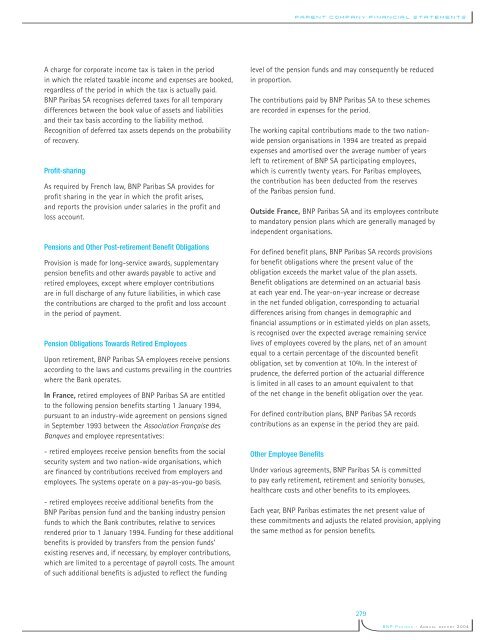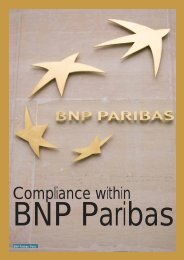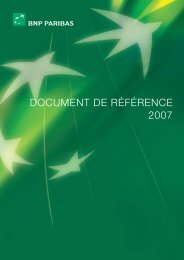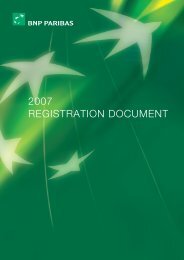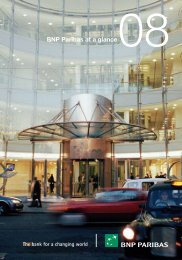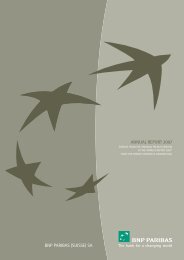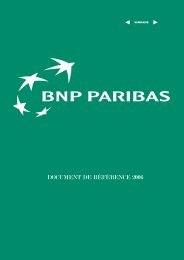La banque d'un monde qui change 2004 - BNP Paribas
La banque d'un monde qui change 2004 - BNP Paribas
La banque d'un monde qui change 2004 - BNP Paribas
Create successful ePaper yourself
Turn your PDF publications into a flip-book with our unique Google optimized e-Paper software.
Parent company fInancial statementsA charge for corporate income tax is taken in the periodin which the related taxable income and expenses are booked,regardless of the period in which the tax is actually paid.<strong>BNP</strong> <strong>Paribas</strong> SA recognises deferred taxes for all temporarydifferences between the book value of assets and liabilitiesand their tax basis according to the liability method.Recognition of deferred tax assets depends on the probabilityof recovery.Profit-sharingAs re<strong>qui</strong>red by French law, <strong>BNP</strong> <strong>Paribas</strong> SA provides forprofit sharing in the year in which the profit arises,and reports the provision under salaries in the profit andloss account.Pensions and Other Post-retirement Benefit ObligationsProvision is made for long-service awards, supplementarypension benefits and other awards payable to active andretired employees, except where employer contributionsare in full discharge of any future liabilities, in which casethe contributions are charged to the profit and loss accountin the period of payment.Pension Obligations Towards Retired EmployeesUpon retirement, <strong>BNP</strong> <strong>Paribas</strong> SA employees receive pensionsaccording to the laws and customs prevailing in the countrieswhere the Bank operates.In France, retired employees of <strong>BNP</strong> <strong>Paribas</strong> SA are entitledto the following pension benefits starting 1 January 1994,pursuant to an industry-wide agreement on pensions signedin September 1993 between the Association Française desBanques and employee representatives:- retired employees receive pension benefits from the socialsecurity system and two nation-wide organisations, whichare financed by contributions received from employers andemployees. The systems operate on a pay-as-you-go basis.- retired employees receive additional benefits from the<strong>BNP</strong> <strong>Paribas</strong> pension fund and the banking industry pensionfunds to which the Bank contributes, relative to servicesrendered prior to 1 January 1994. Funding for these additionalbenefits is provided by transfers from the pension funds’existing reserves and, if necessary, by employer contributions,which are limited to a percentage of payroll costs. The amountof such additional benefits is adjusted to reflect the fundinglevel of the pension funds and may consequently be reducedin proportion.The contributions paid by <strong>BNP</strong> <strong>Paribas</strong> SA to these schemesare recorded in expenses for the period.The working capital contributions made to the two nationwidepension organisations in 1994 are treated as prepaidexpenses and amortised over the average number of yearsleft to retirement of <strong>BNP</strong> SA participating employees,which is currently twenty years. For <strong>Paribas</strong> employees,the contribution has been deducted from the reservesof the <strong>Paribas</strong> pension fund.Outside France, <strong>BNP</strong> <strong>Paribas</strong> SA and its employees contributeto mandatory pension plans which are generally managed byindependent organisations.For defined benefit plans, <strong>BNP</strong> <strong>Paribas</strong> SA records provisionsfor benefit obligations where the present value of theobligation exceeds the market value of the plan assets.Benefit obligations are determined on an actuarial basisat each year end. The year-on-year increase or decreasein the net funded obligation, corresponding to actuarialdifferences arising from <strong>change</strong>s in demographic andfinancial assumptions or in estimated yields on plan assets,is recognised over the expected average remaining servicelives of employees covered by the plans, net of an amountequal to a certain percentage of the discounted benefitobligation, set by convention at 10%. In the interest ofprudence, the deferred portion of the actuarial differenceis limited in all cases to an amount e<strong>qui</strong>valent to thatof the net <strong>change</strong> in the benefit obligation over the year.For defined contribution plans, <strong>BNP</strong> <strong>Paribas</strong> SA recordscontributions as an expense in the period they are paid.Other Employee BenefitsUnder various agreements, <strong>BNP</strong> <strong>Paribas</strong> SA is committedto pay early retirement, retirement and seniority bonuses,healthcare costs and other benefits to its employees.Each year, <strong>BNP</strong> <strong>Paribas</strong> estimates the net present value ofthese commitments and adjusts the related provision, applyingthe same method as for pension benefits.279<strong>BNP</strong> PARIBAS - ANNUAL REPORT <strong>2004</strong>


